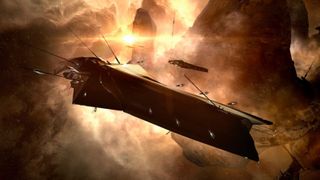After 2 months of dangerous surprises, EVE Online is calming down
The infamous null-sec "Blackout" is no longer in effect, as players breathe a sigh of relief.

Two months ago things started getting really scary in EVE Online. First, the player-controlled territories of null-sec fell victim to an unprecedented alien invasion. Soon after, CCP Games disabled a key feature of EVE Online's in-game chat interface, leaving players in a much more dangerous world. Now the changes, which CCP says were "planned as a temporary event," are being reversed.
Before the "Blackout" went into effect, most star systems in EVE Online would show you a list of players who were currently in the same solar system as you. Given that space is really big and mostly empty, it was a useful way of knowing who might be nearby.
For those players who brave the lawless regions of EVE Online's null-sec space, where there are no rules in place to protect you, knowing who was nearby was invaluable. Miners could tell when enemy pilots had slipped into the system and knew to run for safety, or alliances could muster a defense if a scout spotted a large number of enemy players entering or exiting a star system.
On July 12, developer CCP Games removed that feature, making it impossible to know who was in a system with you unless they actually spoke in the local system chat. It made the null-sec regions of EVE (which heavily outnumber safer star systems) way more dangerous. To survive, players were going to have to adapt.
It was all part of a larger experiment in what EVE Online's developers are calling The Chaos Era. During the Blackout, I traveled to Finland to participate in a very naked version of its annual Fanfest—only this one was held inside of a random Finnish player's house. It was during that strange weekend that CCP Games CEO Hilmar Veigar Pétursson told me that after 16 years EVE Online was beginning to feel a bit stale and CCP were looking to mix things up with bold new experiments—alien invasions and Blackouts being the first of presumably many more.
But now the Blackout has ended and, understandably, many players aren't sad to see it go. Announced earlier this week in a blog post, CCP Games said the Blackout gave it "an incredible amount of insight in terms of player behavior, sentiment and ability to adapt to rapid short notice changes."
"This will help to better inform us on where to take the direction of New Eden in future," the blog post concluded.
The biggest gaming news, reviews and hardware deals
Keep up to date with the most important stories and the best deals, as picked by the PC Gamer team.
As one can imagine, such a radical change to EVE was contentious among its playerbase. While the Blackout initially seemed to be positively received, many of the big alliances affected by it quickly began to bemoan the change. The Blackout also coincided with EVE Online's lowest concurrent player levels since 2006, according to EVE-Offline, which reports on EVE's active player populations.
Though it's not clear if the two are related (but the causation seems likely), that led many to believe that CCP Games was capitulating to players upset over the change. But, as Pétursson explained on Twitter, the Blackout was always intended as a short-term experiment.
Regardless, EVE Online players are breathing a little easier now that they know what threats might be nearby.
With over 7 years of experience with in-depth feature reporting, Steven's mission is to chronicle the fascinating ways that games intersect our lives. Whether it's colossal in-game wars in an MMO, or long-haul truckers who turn to games to protect them from the loneliness of the open road, Steven tries to unearth PC gaming's greatest untold stories. His love of PC gaming started extremely early. Without money to spend, he spent an entire day watching the progress bar on a 25mb download of the Heroes of Might and Magic 2 demo that he then played for at least a hundred hours. It was a good demo.
Most Popular







